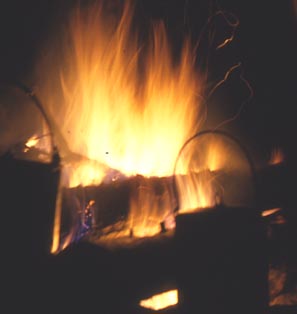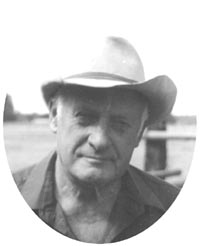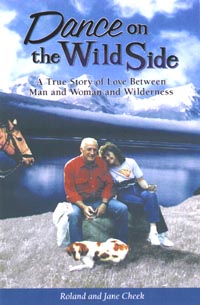a weblog sharing info on outdoor skills and campfire musing by a guy who spends a bunch of time in pursuit of both
CULTURE
WHERE -
TALES ARE TOLD OF
Welcome to Roland Cheek's Weblog
Roland is a gifted writer with a knack for clarifying reality. Looking forward to more of his wisdom
- Carl Hanner e-mail
It strikes me that sharing with others is a high calling, perhaps the highest of all beckonings from the Gods. I'm sure the ministry is an example of that sharing; but I'm not sure that ministers are any more called of God than parents. Or teachers. Or maybe even writers. The bottom line is whether they share their knowledge in such way it could help others find their way through the shoals of life. It is my intent for this Campfire Culture weblog to share some of those outdoors values and campfire meditations a long and active life has provided. Let us know through the feedback section if I'm succeeding. Please.
To access Roland's weblog and columns archives
Tip o' the Day
It has come to my attention, rather late in life I might add, that the most valuable commodity available to humans is information. And my limited observation tells me that's also true for most of what we consider the "higher order" of animals. Else why would bears return to the same meadows and swamps that contain the same succulent grasses and forbs in the spring? Or why would they return to the same high alpine basins where cutworm moths can be found feeding on wildflower nectar in midsummer?
Elk, I've observed, learn through experience when bluebunch wheatgrass turns tasty, and where best it can be found. They've discovered the best migration routes, and how they can be altered depending on weather conditions.
We humans spend a great deal of time researching information: the price of wheat futures, developing plastics, and frantically searching for cures for multiplying diseases. I put much of my life into studying how a horse or a dog thinks. Dogs are easy, horses tougher.
I learned a bunch from Larry. He was a guy who cane to his maturity working around horses and mules used in the U.S. Forest Service. His mentors were the old horse and mule men from pre-World War II days. They taught Larry that it was useless to beat a stubborn mule with a stick, and Larry taught me. And he taught me the most important piece of information of all: that the way to get the best from your ponies is to get inside their heads and make them think they really want to do this thing you want them to do.
"Get inside their head," Larry said. "Find out what they're thinking, then shape that thinking until you're working as a team."
It's a good plan. A working horse has to work, just like a working man or woman. But he, like they, needn't be whipped or starved or abused. If you can share with them what's expected, maybe slip them a handful of oats as a treat, water them along the trail, and adjust their packs when they slip off center, that pony will do its best for you.
And here's another secret: their best is more than good enough -- maybe even better than yours!
Ethan Lester, the 13-year-old California lad who turned into quite an email correspondent because he likes my Western novels, wrote that he was grounded "again" -- which gave me a chance to share a little insight:
"Grounded, huh? Having been a teenage boy myself, and having raised a teenage boy and a teenage girl, I understand how such things happen -- though I'll never stoop so far as condoning the actions leading to it. At least your computer privileges weren'e taken from you, and that's something. Mine weren't either, but, then, computers had yet to be invented back in the stone age when I was a teenage guy.
"Incidentally, my teenage boy wasn't that much of a problem, and therefore wasn't grounded as often as his sister. The reason for it might've been because he was so interested in outdoors adventure that he spent most of his free time outdoors, as opposed to finding misadventures at school or downtown. There are seven stories about some of his adventures in my book about elk, The Phatom Ghost of Harriet Lou. He's presented in that book as being my grandson, but those seven stories scattered throughout that book are actually about our son, Marc, and his father (me). The first of those stories is the first chapter of that elk book -- which means you can also read that on my website.
"Now back to the grounding: I don't know why you were grounded, nor do I care. Just do your penance like a responsible guy should, then you'll be ungrounded. At that time, you should examine why you were grounded, and decide whether it was really worth it. Doing the right thing isn't a matter of whether or not you get caught, but a matter of living with yourself after doing the thing that caused your grounding. And yeah, I've done a thing or two during my life that I'm not so proud of. But I took my punishment like a man should and tried to do better next time -- not because I was afraid of punishment, but because there are right things to do and wrong things to do. Spending time on penance left me plenty of time to cogitate on which was which.
"Okay, you didn't ask for this, but I like you, so what the heck?"
WHERE'S THE "REAL" CONSERVATIVES?
I'm not much into gambling. No poker. No slots. No gaming tables. The only allure Las Vegas has for me is a reasonably priced town in which to sleep and eat while on my way farther south.
About the only game of chance in which I can be counted upon to indulge in is punchboards -- not the ones found in bars, understand, but the type lurking every two years behind the curtains of precinct voting booths. So far, my luck at those punchboards have reinforced a conviction that I should continue to stay away from pasteboards, one-armed bandits and rolling ivories.
Judging from the past (and what other means have we?), most of my contemporaries aren't doing so well at their voting crapshoot either, else why skyrocketing prices, low wages, trashed environments, zillion-dollar budget deficits and hyper-inflation?
Perhaps we should all re-evaluate how we play the game. And maybe it wouldn't hurt if we peeked under the table to see who else might be pulling the levers.
What do we look for in candidates? Republican or Democrat? Conservative or liberal? Ones who support individual rights or the protection of state oversight? Those who support the rewards of free enterprise or the gifts of more entitlement programs? Ones who favor economic development over environmental protection; or the other way around?
For my money, I find few satisfacory choices. Almost invariably, those who favor fiscal restraint would sacrifice the American environment we know (and love) in order to achieve a sound economy. And the policies of our environmental protectors seem always to spend us into bankruptcy while pretending a rosy future for the next generation.
Why must this be so?
How did our interpretation of the root-verb "conserve" become so convoluted that only a fiscal liberal can be a card-carrying conservationist and a fiscal conservative must be a "damn the torpedoes, trasj the environment!" developer? Personally I yearn for a candidate -- no matter the party -- to tell me he (or she) aspires to office because of a crying need to help contain our budget deficit AND protect our nation's great environment.
So far that hasn't happened, though I've been visited by -- and visited with -- a half-dozen candidates up for election or re-election this year. It's sad, but in no case is there a single one whose promises, past history, or track record demonstrates a solid commitment to both fiscal conservatism and resource conservation.
We caring Americans cannot allow conservation leadership to be held only by those folks holding the liberal philosophy. To do so will mean conservation must continually be jeopardized, held eternally ransom to election-year politics.
Yet fiscal conservatives who have no demonstrated concern for our natural resource future, it seems to me, have their heads in the sand. Concern for the environment will only grow as its quality continues to decline. Similarly, environmentalists must recognize that true conservation -- careful husbandy of America's great natural resources -- can only flourish in a nation with a solid national economy.
That, you see, is why I search for candidates who'll promote our best state and national interest; ones who'll demonstrate (or promise to do so) that they will conserve fiscally AND environmentally.
Those two kinds of conservation are NOT mutually exclusive!
Are they?
Roland Cheek wrote a syndicated outdoors column (Wild Trails and Tall Tales) for 21 years. The column was carried in 17 daily and weekly newspapers in two states. In addition, he scripted and broadcast a daily radio show (Trails to Outdoor Adventure) that aired on 75 stations from the Atlantic seaboard to the Pacific Ocean. He's also written upwards of 200 magazine articles and 12 fiction and nonfiction books. For more on Roland, visit:
www.rolandcheek.com
Recent Weblogs
Tuesday September 30, 2008
for more info about these and other Roland Cheek books
Book containing the seven chapters with the grandpa's and the kid's annual wilderness hunting trip
There's a bunch of specific info about Roland's books, columns, and archives. By clicking on the button to the left, one can see Roland's synopsis of each book, read reviews, and even access the first chapter of each of his titles. With Roland's books, there's no reason to buy a "pig in a poke."
for detailed info about each of Roland's books
Read Reviews
Read their first chapters
For interested educators, this weblog is especially applicable for use in wildlife and environmental classes, as well as for journalism students.
Roland, of course, visits schools. For more information on his program alternatives, go to:
Dance On the Wild Side and Montana's Bob Marshall Wilderness
two other books set amid wilderness adventure; one the story of Jane's and Roland's life; the second an 80 page 9 X 12 coffee table book with 100 full-color photos
NEXT WEEK:
SNOW: THE SILENT INVADER
www.campfireculture.com
Roland's My Best Work is Done at the Office shares many stories about horses and their antics amid the wild Rockies. In fact, the author says his objective in the book's beginning was to ". . . afford six plough horses and a Labrador retriever. We're down now to four aging ponies and one photograph of the greatest dog who ever lived -- the task of turning dream to reality is illusve and requires modifcation."
to visit Roland's newspaper columns and weblog archives
source links for additional info
to send this weblog to a friend
to tell Roland what you think of his Campfire Culture weblog






